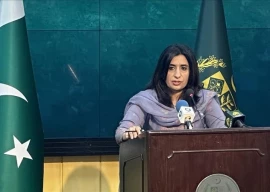As the editor and publisher of journal Aaj, Ajmal Kamal, would say, it did cause a drama because of Saadat Hasan Manto.
“Manto was a shocker, he adopted unconventional values which were considered bad on purpose,” he said. “He wrote about what disturbed him.”
Manto’s ‘Naya Kanoon’ was first included in the eleventh grade Urdu textbook Gulzar-e-Urdu in 1993. The story was about a tonga driver named Mangu who thought that the 1935 Act would bring about a change in society. Mangu judged politicians by the number of people who gathered at their ‘jalsas’. The leaders’ greatness increased proportionally to the number of brawls, fights and arguments that broke out at the gathering.
Kamal, who edits the quarterly Urdu literary journal from Karachi, runs a bookshop and City Press, a small publishing house. He was speaking at The 2nd Floor (T2F) PeaceNiche on Thursday on the topic of ‘Manto Censored by the Sindh Textbook Board’. This was the first session of a series featuring readings of the expunged portions of Manto’s story, “Naya Qanoon”, and thoughts on its inclusion in the Urdu textbook for Class 12.
Kamal went on to say that although ‘Naya Kanoon’ was controversial, it was approved by the provincial textbook board only to be later censored. “There is a part in the text where Mangu puts his hand on his pregnant wife Gangawatti’s belly to feel the baby, it was removed,” he said. “They also removed the wife’s name.”
The part where Manto mentioned Mahatma Gandhi and Jawaharlal Nehru as great leaders was also removed because it went against what students are taught about Partition. “The master stroke was when a British soldier asks Mangu to take him to Heera Mandi. The censor board removed Heera but kept Mandi,” explained Kamal. “As it was taboo to talk about the Communist party, all references to it in the story were also taken out.”
The publisher said that this was done because of Pakistan’s political dependence on the United States of America, and Cold War paranoia. He added that many people in the country were still afraid to discuss it.
According to Kamal, ‘Thailay Wala Shehzada’ by Khwaja Hasan Nizami was also heavily censored. Words such as shaarab (liquor), makhmoor (intoxicated), tawaif (courtesan), were deleted.
“There are two myths about literature. The first one is that is has no place for crude words and the second one says that it is only for cultured people,” he said. “You cannot ignore Manto, he basically had to invent a vocabulary for himself.” According to Kamal, it was important to include Manto in the syllabus because he was the first post-colonial short story writer and especially since his version of events was not in accordance with the ‘sarkari’ version.
A cursory observation of Manto’s work shows that he wrote about what was going on in the hearts and minds of the people. Unfortunately in Pakistan, censorship and suppressing criticism have been popular with the government. It started with the Public Safety Act Ordinance in 1948, which was ratified by the Constituent Assembly in 1952 as the Safety Act.
While talking about the ordinance, Kamal mentioned that a Lahore-based periodical named Savera was the first periodical to be banned and its editor, Zaheer Kashmiri, was imprisoned without trial.
According to the Kamal, censorship stems from the need to have a common national identity, which really came into focus with the Pakistan Movement in the 1940s. He added that a common national identity would only work if the individual identities were not suppressed.
Journalist Ghazi Salahuddin added that he felt Manto’s ‘Naya Kanoon’ should not be censored. “The students are young adults and can be trusted with their own opinions,” he said. “The content can be explained to the students but it is very important to include Manto in our text[s] as he is one of the greatest short story writers.” He added that perhaps authors should be given more freedom than journalists to express what they think and feel.
Text by Tehmina Qureshi design: amna iqbal
Published in The Express Tribune, October 29th, 2011.
COMMENTS (4)
Comments are moderated and generally will be posted if they are on-topic and not abusive.
For more information, please see our Comments FAQ



1730884134-0/BeFunky-collage-(26)1730884134-0-165x106.webp)




1730379446-0/WhatsApp-Image-2024-10-31-at-17-56-13-(1)1730379446-0-270x192.webp)
1730985983-0/Express-Tribune-Web-(28)1730985983-0-270x192.webp)
1730797335-0/Untitled-design-(81)1730797335-0-270x192.webp)






He should have never left India. He was quite succesfull in Bombay film industry and had lot of influental friends in the industry.
Saadat Hasan Manto.Incomparable.Evolved his own style.Read him in english translation. Wish could read him in original.From what I know about his later years in Pakistan till his death makes me very sad.
Kudos to Tribune for covering Mr. Ajmal Kamal's lecture. His research is very meticulous and provides a very important perspective to our young generation.
“There are two myths about literature. The first one is that is has no place for crude words and the second one says that it is only for cultured people,”- well observed :)